HomeTermine
Die SchuleLeitbildKollegiumFachbereicheHauptberufliche LehrkräfteNebenberufliche LehrkräfteAbgeordnete LehrkräfteVerwaltungLehrerpraktikaLehrerfortbildungenPädagogischer TagSeminarschuleSchulpsychologieJugendsozialarbeitQualitätsmanagementSchul-Erlebnis-
PädagogikSchulhausEDV-AusstattungKooperationenWirtschaftsschuleDie BerufeSchülerinformationDer Förderverein
ProjekteAuszeichnungen
Staatliche
Berufsschule II Coburg
Kanalstraße 1
96450 Coburg
Tel. 09561 89-5400
Fax 09561 89-5419
info@bs2.coburg.de
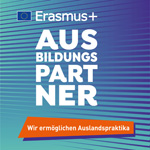
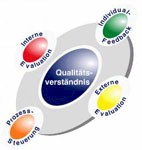
|
 THE MALTA EXPERIENCE
Intercultural & Communication Skills in International Adult Education
What is Hell? German policemen, Swiss lovers, French engineers, Italian bankers, and British cooks.
What is Heaven? German engineers, Swiss bankers, Italian lovers, French cooks and British policemen.
This might be a striking example of how stereotypes are deeply engrained in our mindset and shape our behavior. Since vocational colleges have been establishing
contacts to educational institutions and companies all over Europe and even outside in recent years, the issue of intercultural awareness and communication has to
be properly addressed in training courses. How do you effectively communicate across different cultures in meetings and presentations e. g. when it comes to
presenting your own vocational college? How do you come to terms when deadlines in project work, such as in Erasmus+ funded mobility projects, are not met,
the power status among project members remains unclear, or criticism is not adequately expressed according to cultural patterns of the host country? The way Germans
engage in conversation is not exactly the British or the Italian way.
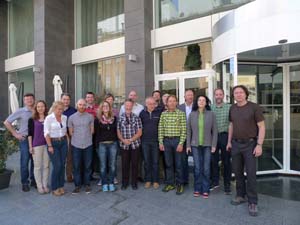
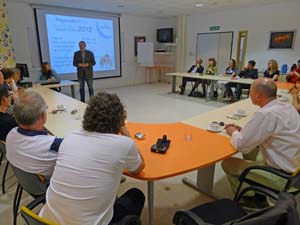
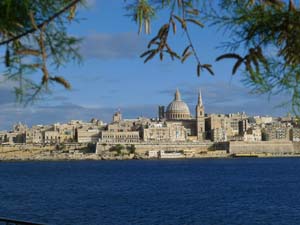
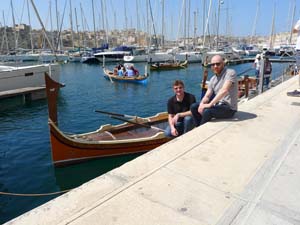 |
We, Sebastian and I, signed up for this one-week course at ETI (Executive Training Institute) in Malta in order to get a fuller understanding of the competence
framework when moving across cultural borders, and to practice intercultural knowledge in group activities, presentations and role plays. Malta is an ideal venue
since it offers a rich blend of different cultures that have had an impact of the Maltese way of living. Besides Italian and Arabic elements, it is above all the
British influence in terms of culture and language that attracts language students and tourists alike. With Susan Kraus and Nick Brieger acting as high professional
and versatile trainers from York (England), we were offered a wide range of topics ranging from improving language knowledge and skills, enhancing communication
competence to touching on matters of interpersonal competence and intercultural competence, and even some project management skills. Communication competence was
put to a test by short presentation exercises and vivid group discussions, e. g. focusing on the declining numbers of students that are entering vocational training
in Germany these days. We became familiar with different types of how to deal with aspects of time in different cultures. People living in ‘monochronic’ cultures,
as we Germans tend to do, do one thing at a time; they concentrate on the job and take time commitments seriously. Conversely, ‘polychronic’ people do many things
at once. They get easily distracted and base promptness on the relationship, for example as it is in Asian cultures. Since culture as a shared system or way we
think and behave remains mostly invisible and in the mindset and attitude of people, it is important for us to explore the way people behave and why they do so.
If a German gives bluntly a “No!”, people in other cultures would probably react more deferentially by saying “That might be difficult.” The ‘iceberg model’
disclosing attitudes und values underneath the surface of overt behaviour may serve as a simple guideline.
The most challenging exercise however was project work in the context vocational colleges going international. Teams will only act efficiently and effectively
if there are a variety of group members showing different personality and working-style thus creating synergy. In the first stage, our trainer Nick mapped some
aspects of our personality according to styles of decision-making, building relationships, gathering information and organizing. Based on these findings, we
could find ourselves being placed in a grid or wheel of ideal types, be it explorers, advisers, controllers or organizers. In the last stage, we were given the
task of choosing a group leader and presenting our strengths and weaknesses as a group. On the last day, we had the chance of presenting our own institute in
front of a watchful audience. Even for us as professionals in the field of teaching, it required a lot of adeptness in bringing key factors of effective presentation
simultaneously together: structure, content, voice & body language and foremost, language accuracy. The course provided a perfect mix of intellectual intake as
well as practicing social and language competences in a relaxed and friendly atmosphere. Nice accommodation in host families or inhouse apartments at ETI at the
heart of the lively fishing town of St. Julians close to Valletta, also contributed to us teachers feeling at ease there.
Though we had a tight training schedule, we could explore the island by ourselves and discover the rich culture and breathtaking coastline. Valletta, capital of
Malta and former stronghold of the crusaders, hospitallers and knights of St. John, invited us to take a view from above the fortified parts of the city onto the
beautiful harbour and shipping port. We had the opportunity to go for a walk in the medieval and baroque-style city, admire the co-cathedral of St. John’s with its
richly decorated interior and two marvellous paintings of Caravaggio. Some of us were drawn to the lively fish market of Marsaxlokk to get some tasty seafood;
others visited the ancient temples of Hagar Qim and Mnajdra, which could be loosely compared to Stonehenge. We can only speculate upon the purpose of building
huge walls with openings through which sunbeams can only enter exactly at equinox. The most experienced of us, equipped with rope and climbing gear, even dared
to climb up those marvellous high cliffs next to the “Blue Grotto” and got rewarded with a gorgeous view from above.
We would like to thank Marin Kolb of district government for Upper Franconia (Regierung von Oberfranken) for having organized this professional training course on
Malta. Martin did a great job by tapping EU financial resources and undergoing the cumbersome procedure of application. Many thanks as well to Franco DeBono, the
director of ETI, for welcoming us at his institute and organizing the explorative tours to MCAST vocational college as well as to the large Playmobil production
site. We are convinced that all participants of this training course could only gain from the Malta experience and we hope that more people will embark on a journey
to this picturesque and diverse island.
Michael Hauck und Sebastian Toni
|
...zurück zur Übersicht Lehrerfortbildungen
|





















